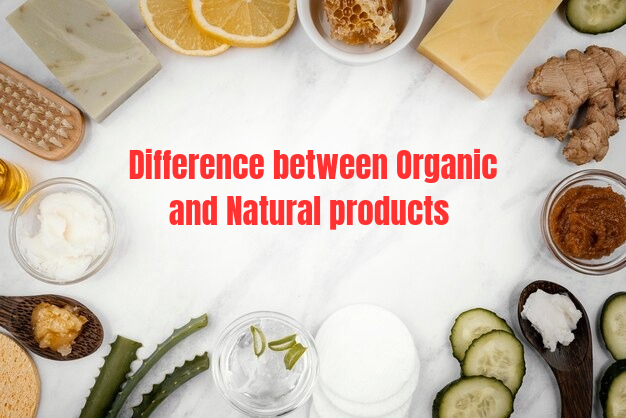Now, what sometimes creates confusion between organic and natural products is the definition and regulation that brands have for each one of them. Organic products meet government set stringent rules that give the farmers crop growing guidelines that they should not use synthetic pesticides and fertilizers or grow crops with GMOs. Natural products are processed very little and do not contain artificial substances But no laws regulate natural products as strictly as those for organic products. This is a difference that consumers need to know so that they can make sound decisions especially when choosing what to buy.
Understanding the Basics of Organic Products
Organic Products is not just a fad but it is a testament to the fact that people are more careful with the type of farming they support and encourage. The word ‘organic’ is controlled by such bodies as the USDA in the United States where there are strict parameters for use of the word ‘organic’. These guidelines reflect all kinds of activities from crop cultivation techniques to the touches involved in processing the eventual outcome.
To make a product qualify for organic the product has to be grown without the use of chemicals like pesticide, herbicides or fertilizers. Also, no GMOs are allowed in organic farming in order to keep the plants in the most natural state as can be allowed. Livestock used for organic meats, dairy and eggs should feed on organic content which should allow them to graze or roam outside, they cannot use antibiotics or growth hormones on the animals.
The Certification Process for Organic Products
Probably the most significant factor about organically produced foods, especially their marketing, is the aspect of certification. The Organic label produced by the USDA is a well known symbol used in the United States of America that means that the product has been produced in accordance with the rules pertaining to organic food production established by the USDA. This seal must be earned by passing through the inspection and certification of the entire farm or even the processing facility. It also entails periodic review that has to be done to check on the continuing compliance with organic standards.
Certification not only covers the gardening and the reaping of crops but also in the processing as well as handling of organically produced crops and other items. This is an implication that each and every process, right from the point of production in the farm to the point of consumption at a consumer’s home is regulated to check with the organic label. Thus, the consumer has certainty that when he pays his hard earned money on an organic product, he is paying for a product that has been produced in the best ecologic friendly manner possible.
What Defines Natural Products?
Whereas, natural products are generally considered as healthier and environmentally friendly, they lack the kind of standardization that organic products have. This is why “natural” is a more ambiguous term than organic, and though the FDA defines it, it does not police it in the same way that it does organic. In most cases, natural products refers to such products that have gone through minimal processing and do not contain artificial components, chemicals or extension of shelf life.
But since there is no law demanding a standard or a certification for products to be termed natural, the usage of the term can actually be very liberal. For instance, a product that has been classified as natural may contain ingredients that are not sourced from organic farming and or those foods that may have been sprayed with synthetic pesticides throughout their growth period. This is a major problem because it leaves the consumer clueless as to exactly what they are getting when they decide to go for a product with the natural label on it.

The Differences in Labeling: Organic vs. Natural
There is a difference between organic food and natural food but the actual difference is not as significant as many people might believe.
The labeling of the foods as organic and natural foods can sometimes cause confusion to most of the clients. Produce and foods which are labeled organic must meet various requirements according to set authorities like the USDA and they are usually endorsed with a label that shows that they are organic products. This seal is a very persuasive message that the product has been made following standard for organic food production.
On the other hand, natural products have no standard label or certification benchmark as used in the GM products. This implies that anyone can label his/her product as ‘natural’ whether it is a food product, a cosmetic product or anything else without knowing how it was processed. Therefore, consumers are required to be very cautious when buying natural products as this label does not offer the quality and environmentally friendly aspects as offered by the ‘organic products’ label.
Environmental Impact: How Organic and Natural Products Differ
Another study shows that one of the main factors that lead to the purchase of organic products is their environmental friendliness. In addition, organic farming practices aim at improving the condition of the soil, water conservation and minimum pollution and promotion of biodiversity. Organic farming tends to exclude the use of synthetic chemicals as well as genetically modified organisms; this makes it environmentally friendly and sustainable.
While natural products are promoted as environmentally friendly they are not as beneficial to the environment as organic products. This is because the term natural has not been prescribed and hence there is no assurance that natural products are produced by environmentally friendly methods. At times these natural products may be grown through the conventional methods that use chemicals and fertilizers which are dangerous for the natural environment.

Health Considerations: Organic vs. Natural Products
In this case we will attempt to clarify the differences between ‘organic’ and ‘natural’ products.
Another domain in which consumers think that local products in the supermarket are healthier are foods that are labeled organic. The fact that organic products do not contain synthetic pesticides, GMOs and antibiotics is a plus for those who may be affecting by the side effects of these products. Secondly, investigation has revealed that organically grown fruits and vegetables are richer sources of some nutrients, for instance, antioxidants than those conventionally produced.
Thus, it is important to note that natural products, though significantly advertised as being healthier than others, may not be as healthy as organic products. One disadvantage of natural products is that they have no strict control and sometimes if not subjected to inspection may contain synthetic additives or the natural product may have been sprayed with pesticides during its production. The healthy consumers should ensure that they read the labels of these natural products and avoid those products that are produced by these companies since they harm the consumers.
The Price Factor: Why Organic Products Tend to Be More Expensive
And what is the most essential difference between organic and natural products? Probably, the fact that the former can be considerably more expensive than the latter. Most organic products are costly as compared to the natural or the normally produced products. Such a price difference can be explained by a number of factors, the increased expenses on creating organic productions, the certification of organic foods, and lower productivity that can be experienced by the owners of organic farms.
Compared to conventional farming, organic farming involves more use of labor and resource productivity hence increasing the costs of production. Also, the procedures of obtaining the organic products certification involve a lot of money and a lot of time which contributes to the overall price. However, there is always a market for organic products since most people are willing to spend the extra bucks to get the perception of healthy foods and the environment.
Natural products, as contrasted to synthetic products, are often cheaper since the former does not need to undergo rigorous process and certification as the latter. But, the lower cost of these products can have a drawback, for instance synthetic additives or Figure 1 less ecologically favorable technology.
Consumer Preferences: Why Some People Choose Natural Over Organic
However, the consumers are still induced to opt for the natural products as they purchase the organic products. This preference can be facilitated by factors such as the cost of the food products, availability of the products and cultural or individual perception about health and the environment. The word ‘natural’ has a positive connotation by which some consumers understand a less complex and healthier product even though it does not bear the organic logo.
Also, it is evident that natural foods are easily accessed as compared to organic foods, especially in areas where growth of organic foods has not fully developed. Such availability, coupled with the relatively lower price points, also means that natural products are a much more financially reasonable choice for the consumers who are in a position to make healthier choices for themselves.
Making an Informed Choice: Organic vs. Natural
Organic vs Natural The two terms appear to interrelate with each other however; there is a thin line between the usage depending on the context of the commodity. This paper focuses on evaluating the meaning and relevance of the two terms.
This is specifically true in choosing between organic and natural products where the principle of the betterment of one’s life betterment by consumers should guide consumer decisions on what they value most. Certainly, the environmentally friendly and the utilization of organic products are the best ways to go if one does not wish to use synthetic chemicals. Organically labeled products are likely to be certified and regulated and this gives more confidence to the consumer as compared to natural products.
However, if the aspects such as price and availability are prioritized, natural products can be quite suitable, but if consumers need to pay more attention to what they are actually eating, reading the labels and understanding the brand that the product belongs to. I believe knowing what organic and natural mean should help consumers to make a right choice for themselves, for their beliefs, and for their habits.
Conclusion: Organic and Natural—Both Have Their Place
In the debate of organic and natural products, we cannot say that it is either one or the other the best. There are benefits and disadvantages in both types of products and it is up to the consumer to decide on which would suit the best for his/her lifestyle. It is thus equally important that users are fully aware of the differences between organic and natural products to ensure that they purchase products that best fit into their lifestyles, health needs and environmental impact. Despite these, at least knowing makes it easier to decide between organic or natural, it is up to what is best for you and the environment.
FAQs About the Difference Between Organic and Natural Products
1. Are organic products always better than natural products?
Not necessarily. Organic products are well controlled and they have standards to meet hence safer for those who are afraid of synthetic chemicals and GMOs. Nonetheless, natural products are also quite beneficial in selected cases where they’re not proceeding through experimentation with many chemicals. The decision depends on many factors like health risks and effects on the environment, and cost among others.
2. Can a product be both organic and natural?
It must be noted that it is possible to have products that are both organic and natural. In fact, a good number of the organic products are also natural because they undergo little processing and contain no synthetic preservatives. Nonetheless, not all natural products are organically produced, and therefore, may not be certified as organic products.
3. How can I tell if a product is truly organic?
Use external seals, known by the USDA Organic label as an example, to guide your choice. This seal is an assurance that the product has been processed through organic farming and processing techniques. Also, you need to also find out if the ingredient used in the preparation of the food contains any synthetic chemicals, Genetically Modified Organisms, or any other non-organic material.
4. Is the term “natural” regulated by the government?
The phrase is less tightly controlled than the term “organic.” Although it means a product contains no additives or has gone through minimal processing, there is nothing like natural standard or organic standard that these products can meet. This means that the application of the term can be more flexible, in other words, one has to look into the labels.
5. Are organic products more expensive than natural products?
Indeed, organic manufactured goods are most times more costly due to high costs of practicing organic farming, certification procedures, and less production. However, the survey showed that the majority of the consumers think that it is worth spending more money on organic produce since they are less exposed to synthetic chemicals and are better for the environment.
6. Do natural products contain GMOs?
It is essential to know that natural foods may be produced from GMOs if they are not marked ‘non GMO’ or ‘organic.’ While organic foods never contain GMO foods, natural foods do not have the same ban, thus you expect to find GMO foods labeled on a product if you have a special concern for them.
7. Are organic and natural products better for your health?
The reality is that consumers think that organic products are better for a person’s health because they are not produced with synthetic pesticides, genetically modified organisms or antibiotics. The findings of some studies indicate that organic foods have better nutrient density as compared to conventionally grown foods. Natural products are also healthy but again its benefits depend on the ingredients used and the way they are produced. There is much that needs to be done with regards to reading labels, doing research and making wise decisions.


1 thought on “What is the Difference Between Organic and Natural Products?”